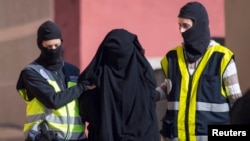At least 15 young Western women who joined Islamic State (IS) and married jihadi fighters are now widows after the militant group suffered losses in clashes in Syria and Iraq, according to researchers who closely monitor Islamist radicals online.
The Institute for Strategic Dialogue (ISD) think tank in London gave Reuters access to its database of 106 foreign women it says have moved to IS territory and are active online.
Fifteen of the women have either mentioned on social media that they lost their husbands in fighting, or other known IS supporters have announced the men's deaths online, said ISD researcher Melanie Smith.
Although Reuters could not independently confirm the identities of the women, many of them have been said by relatives to have left their home countries for Syria and Iraq.
Some have also been named by law enforcement officials in their countries or leave online traces, such as having geographical locators on their Twitter accounts.
Smith said most of the women believed to be widows lost their husbands in the last six months. IS, which swept through northern Iraq last June, has recently suffered some battlefield setbacks including at the Syrian city of Kobani where it was defeated by Kurdish forces backed by U.S.-led airstrikes.
The morale of foreign women is a concern for IS because it is trying to attract females from abroad to marry Islamist fighters and populate the territory it holds.
The latest edition of the IS online magazine Dabiq urged "every [foreign] sister who has been afflicted with the loss of her husband on the battlefield" not to become disheartened.
"Be firm, my dear sister, be patient, and await your reward… be wary, be wary of thinking of going back [home]," it said in an article, which told foreign women that migrating to the Islamic State is a binding religious obligation.
Given the anonymity of the Internet and the status of IS women who are hidden from public view, identifying Western females in the group's ranks is difficult.
Smith's database counts foreign women who identify themselves as living in territory controlled by IS and are active on social media. They will often indicate their nationality in Twitter bios or pseudonyms.
In IS, women whose husbands have been killed soon move out of their marital homes and join a "shuhada" house for the widows of martyrs, according to their postings.
Encouraged to remarry
The widows are encouraged to marry again soon after a traditional Islamic mourning period of four months and 10 days, according to Aqsa Mahmood, a Scottish woman of Pakistani origin whose family has acknowledged her identity. Mahmood has a Tumblr blog that details her life in Syria with IS.
The women often write about life in IS territory in detailed postings and tweet photographs of street scenes in Syria or Iraq. Their postings range from expressions of grief to calls to assassinate Western leaders to occasional expressions of discontent over their treatment. Their posts do not appear to be centrally controlled by IS, researchers say.
Rita Katz, founder of the U.S.-based SITE Intelligence Group which monitors jihadi websites, said there were likely many more than 15 widows since the foreign women tend to marry IS fighters.
"Not all of them are online tweeting about it," she said.
Smith says that all of the 15 widows she has identified are between 16 and 26 years old. Based mostly on references in their postings, she believes that seven of them are British, with others from France, Belgium, Canada, the United States, Australia and South Africa.
A woman known online as Umm Jihad said her Australian husband Suhan Rahman was killed in March. He "died the best of deaths so it's nothing to be upset about, it's just that we're still here, that's the hardest part," she later tweeted.
The BuzzFeed News site last weekend reported that Umm Jihad is a 20-year-old woman of Yemeni descent from Hoover, Alabama, which would make her the first known U.S. woman to be widowed.
BuzzFeed interviewed the woman's father who acknowledged she had joined IS. Reuters was unable to verify the father's identity or contact him.

